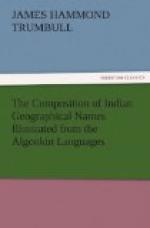Again—every Indian name is complete within itself. A mere adjectival or qualificative cannot serve independently, leaving the real ground-word to be supplied by the hearer. River names must contain some element which denotes ‘river;’ names of lakes or ponds something which stands for ‘lake’ or ‘pond.’ The Indians had not our fashion of speech which permits Hudson’s River to be called ’the Hudson,’ drops the word ‘lake’ from ‘Champlain’ or ‘Erie,’ and makes “the Alleghanies” a geographical name. This difference must not be lost sight of, in analysis or translation. Agawam or Auguan (a name given to several localities in New England where there are low flat meadows or marshes,) cannot be the equivalent of the Abnaki ag[oo]a[n]n, which means ’a smoke-dried fish,’[96]—though ag[oo]a[n]na-ki or something like it (if such a name should be found), might mean ‘smoked-fish place.’ Chickahominy does not stand for ‘great corn,’ nor Pawcatuck for ’much or many deer;’[97] because neither ‘corn’ nor ‘deer’ designates place or implies fixed location, and therefore neither can be made the ground-word of a place-name. Androscoggin or Amoscoggin is not from the Abnaki ’amaskohegan, fish-spearing,’[98] for a similar reason (and moreover, because the termination _-h[=e]gan_ denotes always an instrument, never an action or a place; it may belong to ’a fish-spear,’ but not to ‘fish spearing’ nor to the locality ’where fish are speared.’)
[Footnote 96: It was so interpreted in the Historical Magazine for May, 1865 (p. 90).]
[Footnote 97: Ibid. To this interpretation of Pawcatuck there is the more obvious objection that a prefix signifying ‘much or many’ should be followed not by ahtuk or attuk, ‘a deer,’ but by the plural ahtukquog.]
[Footnote 98: Etymological Vocabulary of Geographical Names, appended to the last edition of Webster’s Dictionary (1864). It may be proper to remark in this connection, that the writer’s responsibility for the correctness of translations given in that vocabulary does not extend beyond his own contributions to it.]




